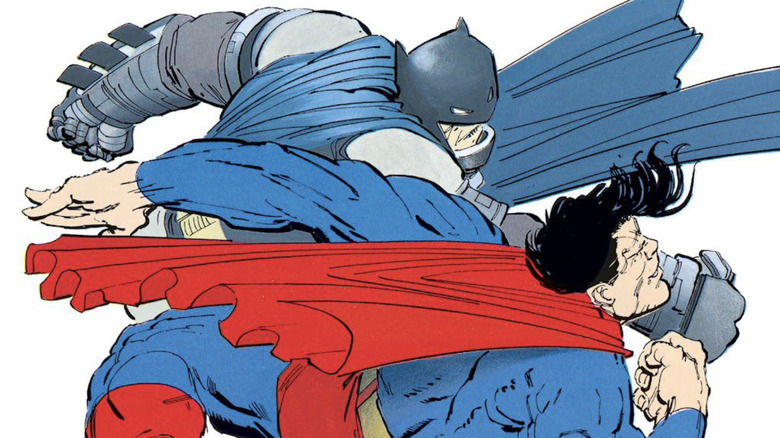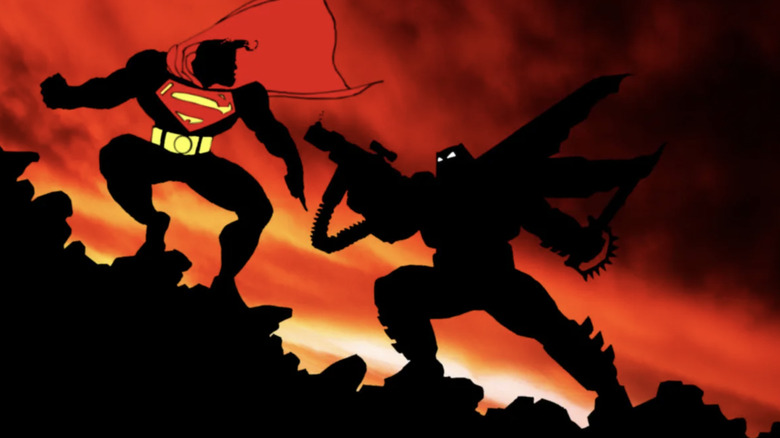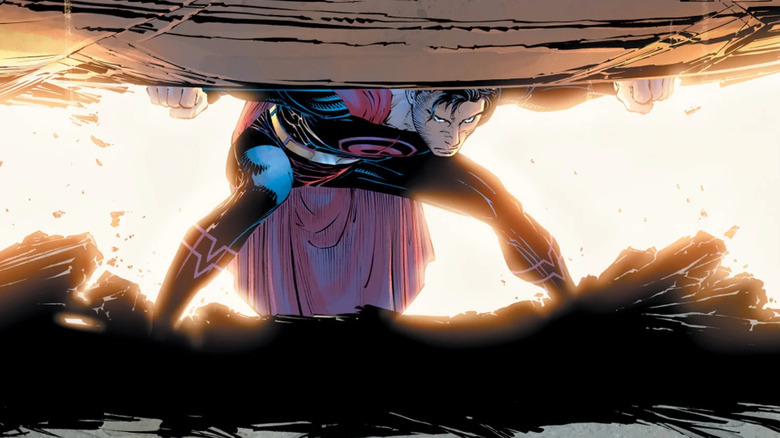Why Superman Was A Villain In Batman: The Dark Knight Returns
Frank Miller is a living comic book legend. For Batman fans, though, the greatest part of Miller's legacy is always going to be him writing and pencilling "The Dark Knight Returns" in 1986 and then, the following year, writing "Batman: Year One" (drawn by David Mazzucchelli). Both are typically ranked as the two best and most influential Batman comics ever. Yet, they're almost polar opposites.
"Batman: Year One" is a stripped down crime story, complemented by Mazzucchelli's realistic art. It's appropriately about Bruce Wayne's first year being Batman and so is set in Gotham City before it became a home for costumed criminals. In "Year One," Batman only fights gangsters and SWAT teams.
While "Year One" is the beginning of Batman, "The Dark Knight Returns" is the ending. Miller, who was approaching 30 and feeling anxious about being older than Batman, wrote a story about a 50-year-old Bruce Wayne coming out of retirement when Gotham needs him once more. "Dark Knight" is a maximalist comic; Miller uses 16 panel layouts when he's not drawing huge splash pages. He also dares to do things no other Batman comic would or could, like having the Joker perish in a final fight with Batman ... or Batman beating up Superman.
Indeed, "The Dark Knight Returns" uses Superman as an antagonist. Unlike other well-known heroes, the ageless Superman is still active. Now, he's an official agent of the U.S. President (a caricatured Ronald Reagan), contrasting the outlaw Batman. The climax of the fourth and final issue is Superman being sent to Gotham to make Batman stand down. Instead, the Dark Knight fights and defeats the Man of Steel with the help of his armor and some handy-dandy Kryptonite.
At New York Comic Con 2016, Miller said, "Superman is the best punching bag you can ever find." After all, who else can take more damage, and keep getting back up again, than the Man of Steel? In "Dark Knight," before his fight with Batman, Superman even takes on a nuke and survives.
"I always wanted to see Batman just beating [Superman] up," Miller continued. "I think both of us [Miller and Brian Azzarello, his 'Dark Knight III' co-writer] have a chip on our shoulder about the Big Boy Scout."
Miller has also said (in conversation with "Batman v Superman: Dawn of Justice" director Zack Snyder) that he's drawn to the "self-made" nature of Batman. "Extraordinary feats come easily to Superman. He can fly and then the rest [...] I enjoy an effort," as he put it. Some of these comments, and his writing of Superman, have led to assertions that Miller hates Superman or, at the least, deliberately puts him down in favor of Batman. Is that really true?
The Dark Knight Returns turned Batman and Superman from Super Friends into super-foils
"The Dark Knight Returns" is a turning point for how Batman and Superman are written together. The two titans clashing, which had previously been playground speculation among young comic readers, was elevated to proper comic canon in full color ink.
Before this, the whole notion of Batman and Superman in a grudge match to the death would've been absurd. Not just because Superman was obviously more powerful, but because since the 1950s, they had been written as best friends. To put them in conflict, Miller redefined their relationship not as birds of a feather, but opposite sides of a coin.
You also see this change in John Byrne's Superman reboot "The Man of Steel," published that same year. Issue #3 is about Superman meeting Batman for the first time; they butt heads, with Superman deeming Batman a criminal, and end the issue only as uneasy allies. Stories since then have oscillated when it comes to the extremeness of Batman and Superman's conflict, but Miller's notion of them as opposites has stuck. Even when they're written as being friends, it's in spite of their differences, and there's typically a smidge of distrust between them.
But how does Miller define the conflict between them? In his aforementioned conversation with Snyder, Miller put it like this:
"Superman is an apologia worrywart, and he's concerned with keeping the world from blowing itself up. Batman's this Dionysian character who's out for blood, and they're perfect opposites in that Batman is the reckless ego and Superman is the fearful superego."
Miller even said Batman is "happier" than Superman. After all, Bruce takes the weight of the world on because he can't live without it. Clark bears it because he (thinks) he's the only one who can. In 2019, Miller would write "Superman: Year One," showing the origin for his Superman, who first appeared (publication-wise) in "The Dark Knight Returns." The cover of "Superman: Year One" #3 (drawn by John Romita Jr.) shows Superman carrying the Daily Planet globe on his back like Atlas holding up the Earth. The symbolism reflects Miller's view of Superman as a "worrywart."
In "Dark Knight Returns," Superman has become a tool of the U.S. government because he thinks that's the best way to maintain peace in a fraught world. To Batman, he's an abettor, with the latter stating:
"Keep talking, Clark ... you've always known just what to say. 'Yes.' You always say yes to anyone with a badge or a flag ... You gave them the power that should've been ours. Just like your parents taught you to. My parents taught me a different lesson — lying on this street — shaking in deep shock — dying for no reason at all — they showed me the world only makes sense when you force it to."
But while Miller wrote these words, understand they aren't his opinion — they're Batman's.
No, Frank Miller does not hate Superman
Frank Miller clearly has a lot of fondness for Batman stemming back to his childhood. His earlier run on "Daredevil" at Marvel feels like him trying to write the Batman comic he always wanted to ... and he did it so well he actually got to write that Batman comic!
In a 2014 interview that Miller did with Playboy, he was asked how he portrays Superman in his Batman comic books, as well as the rumors he hates the character. He pushed up against that assertion, saying that putting Batman and Superman in conflict is about staying true to both heroes:
"'The 'Dark Knight' series is all from Batman's point of view. Batman and Superman are dead opposites. I love Superman. Do I love Batman more? They're not people. They're only lines on paper."
"I find sometimes having a hero do wrong or take a wrong course is the best way to ultimately define what a hero is, especially with my Daredevil and my portrait of Superman," Miller remarked in his later conversation with Snyder. At the end of "Dark Knight Returns," too, Superman implicitly rediscovers his way. At Bruce's funeral, he hears a heartbeat and realizes that Batman only faked his death during their fight. He stares at a disguised Robin/Carrie Kelley ... and smiles and winks. Superman winking at the reader was the typical ending for the "Superman" comics Miller would've read as a kid. That sort of homage clearly comes from a place of affection.
In 2017, Miller described "Year One" as his chance to "take a real, meaningful crack at Superman." The comic foreshadows who Clark will become in "Dark Knight." In the third issue, he's in conflict with Batman until Wonder Woman shows up and makes them see sense.
Miller's big addition to Superman's origin is that a young Clark enlists in the U.S. Marines, thinking that's the best way to help people with his powers. Much of issue #2 is set in bootcamp. Superman fighting the U.S.' wars remains a sticking point about "The Dark Knight Returns," especially since during the 2000s and early 2010s, Miller made jingoistic and Islamophobic public comments (he's since recanted), culminating in the rancid and racist comic "Holy Terror." But in "Dark Knight" itself, Superman intervening in the Cold War is not a triumphant power fantasy of noble imperialism.
Miller's "Superman: Year One" might be different from your preferred Superman (it's definitely not mine), but it's hardly out to diminish or assassinate his character. There's nothing wrong with disagreeing with or disliking Miller's writing of Superman but remember, as the man himself put it, he's ultimately just lines on paper. Different artists are inevitably going to color in those lines in different ways.


